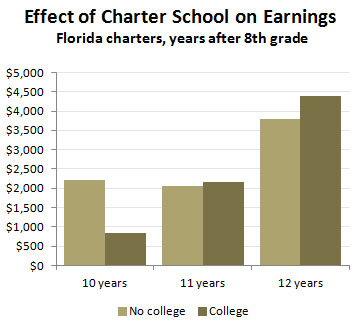Via Alex Tabarrok, here’s a new paper studying the effect of charter schools in Chicago and Florida on college attendance and earnings later in life. I’m especially interested in long-term studies of earnings, which I consider more useful than test scores (which may or may not predict anything) and even college attendance (ditto, though it’s more meaningful than test scores). The research team in this case was able to collect earnings data for about 2,500 charter students in Florida and compare it to similar non-charter students.
This is not a lottery-based approach, which is the gold standard for this kind of research.1 Instead, the researchers compared charter students to students who had attended charters up until 8th grade and then transferred to other schools. They also did all the usual controls for race, gender, family income, etc. This approach has all  sorts of well-known problems with hidden variables, but it was the best available to them.
sorts of well-known problems with hidden variables, but it was the best available to them.
With those caveats, the results were substantial. Twelve years after 8th grade—i.e., by age 23-25, when most college-bound students have graduated—college students who attended charters were earning $4,400 more than college students who didn’t attend charters. Among non-college students, the charter kids were earning $3,800 more than non-charter kids.
As always, take this with a grain of salt. It’s one small study, and the methodology is so-so. But the effects are large, and suggest that experimentation with charter schools can produce valuable results.
1In a lottery approach, kids apply to charters and are chosen by lottery. The winners are then compared to the losers, who attend public schools. This eliminates much of the charter improvement that’s solely because charter kids come from families that are highly motivated to value education.
UPDATE: A regular reader writes in to point out something I didn’t mention:
What I want to flag isn’t the concerns you raised. The major concern is the years the study took place over (1998-2003). Charter schools were still a small part of the market then and they were usually community based….Since then the industry has multiplied and there are have been a flood of crappy charter school chains into the market, many of them for-profit (this is especially true in Florida where Jeb Bush loosened charter school laws.)
This year the national association of public charter schools estimates that there are 625 charter schools in Florida, up from 176 in 2002. There have been lots of change and lots of issues with quality as chains have expanded.
Obviously longitudinal studies like this one always suffer from being out of date, and you can only work with the data you have. Still, this is probably another reason to be cautious about accepting these results until we have quite a bit more corroboration.













